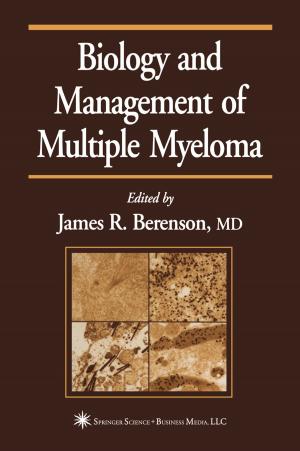Cell Death and Diseases of the Nervous System
Nonfiction, Health & Well Being, Medical, Specialties, Internal Medicine, Neurology| Author: | ISBN: | 9781461216025 | |
| Publisher: | Humana Press | Publication: | December 6, 2012 |
| Imprint: | Humana | Language: | English |
| Author: | |
| ISBN: | 9781461216025 |
| Publisher: | Humana Press |
| Publication: | December 6, 2012 |
| Imprint: | Humana |
| Language: | English |
It is an honor to be asked to write a foreword for this timely book, which assembles contributions from authorities working in the area of pathological nervous system cell death, and has been expertly edited by Vassilis Koliatsos and Rajiv Ratan. That the inap propriate demise of brain or spinal cord cells is at the root of many neurological diseases has been appreciated since the early days of microscopic neuropathology, but it has only been in the last decade or so that pervasive therapeutic nihilism has lifted. In the journey of medical progress, we have reached the shores of a marvelous new land. Three major scientific thrusts in particular have converged to produce the press of ideas covered here. First, burgeoning information about the fundamental nature of central nervous system cell--(;ell signaling, both the fast signaling mediated by conventional neu rotransmitters and the usually slower signaling mediated by neuromodulators and growth factors. A central theme emerging in recent years has been the duality of these signaling mechanisms, which serve the nervous system in health, but which can become the very mediators of neuronal or glial cell degeneration in disease settings. Glutamate-mediated neurotransmission and excitotoxicity have been the defining and best-studied examples, but many other examples have also emerged. Second, delineation of the molecular under pinnings of programmed cell death, and an appreciation of their awesome power.
It is an honor to be asked to write a foreword for this timely book, which assembles contributions from authorities working in the area of pathological nervous system cell death, and has been expertly edited by Vassilis Koliatsos and Rajiv Ratan. That the inap propriate demise of brain or spinal cord cells is at the root of many neurological diseases has been appreciated since the early days of microscopic neuropathology, but it has only been in the last decade or so that pervasive therapeutic nihilism has lifted. In the journey of medical progress, we have reached the shores of a marvelous new land. Three major scientific thrusts in particular have converged to produce the press of ideas covered here. First, burgeoning information about the fundamental nature of central nervous system cell--(;ell signaling, both the fast signaling mediated by conventional neu rotransmitters and the usually slower signaling mediated by neuromodulators and growth factors. A central theme emerging in recent years has been the duality of these signaling mechanisms, which serve the nervous system in health, but which can become the very mediators of neuronal or glial cell degeneration in disease settings. Glutamate-mediated neurotransmission and excitotoxicity have been the defining and best-studied examples, but many other examples have also emerged. Second, delineation of the molecular under pinnings of programmed cell death, and an appreciation of their awesome power.















